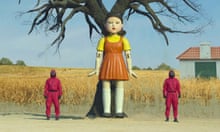This article contains spoilers for the Netflix series Squid Game
The South Korean survival drama Squid Game seems to be the only thing anyone is talking about, having hit No 1 on Netflix in 90 countries and become the subject of endless memes and conversations. In it, contestants – among them a migrant from Pakistan, a North Korean refugee, a terminally ill pensioner and a gambling addict and all, for various reasons, interested in a cash prize – compete with hundreds of others to the death, in violent iterations of childhood games, all supervised by eerie masked henchmen. It’s surreal, but also rooted in reality; in South Korea, household debt is now equivalent to more than 100% of GDP. As Nineteen Eighty-Four, Black Mirror and The Handmaid’s Tale feel less and less like dystopian works the worse the world becomes, Squid Game too feels strangely cautionary.
The show’s director, Hwang Dong-hyuk, says Squid Game is an allegory of modern capitalism, but it also takes aim at what we deem entertainment. Later on in the series, it is revealed that the grisly games are being watched by millionaires who bet on the players’ chances from a lavish VIP lounge filled with champagne and chandeliers. Watching contestants fight for the money and their lives is gruesome, even more so when we realise this is being done for the amusement of an audience. Like many TV shows and films, it examines our fixation with seeing people suffer and uses the conventions of competition TV to do so.
Indeed, like the Roman colosseum, reality TV continues our proclivity for seeing others get hurt and humiliated – making it the perfect basis for drama. The games and visuals of the series reference Japanese shows such as Takeshi’s Castle and Za Gaman (The Endurance), the DNA of which can be found in the Bushtucker trials of I’m a Celebrity. Films about behavioural experiments and survival dramas such as Circle, Battle Royale and The Killing Room fascinate because of their insights into the human psyche and just how far we will go to win or survive, a core tenet in everything from Survivor to The Bachelor. Squid Game does this, but takes it a step further by interrogating those of us watching on the other side of the screen. In this instance, they are the morally barren super-rich, but on an average day, it’s average people.

It would be too far to say Squid Game is a warning from the future (I hope not anyway, but if the past two years has taught us anything, it’s that anything can happen) but it does feel prescient. Besides, culture that seems extreme and unrealistic often looks different after a few years pass, when it then feeds back into reality TV. In 1968, the BBC television play The Year of the Sex Olympics looked at the societal effects of television and focused on a programme called The Live Life Show, following a group of people left to fend for themselves on a remote island. At the time, the idea of an unscripted soap opera was lunacy, but the play is now cited as having foreseen Big Brother, Castaway and Survivor. Likewise, the 24-hour surveillance and fame-for-nothing of The Truman Show seemed dystopian in 1998, but less so now as we willingly document our own lives via Instagram Stories and Facebook live streams.
Black Mirror has offered many instances of this interdependence, commenting not only on our ever increasing reliance on technology but our instant-fame culture and the ethics of reality TV. In Fifteen Million Merits, arguably the franchise’s strongest episode, a pre-Get Out Daniel Kaluuya inhabits an entirely grey, not-so-distant future, surrounded by a continuous stream of entertainment and advertising on screens that cover every surface. The only potential reprieve is a Britain’s Got Talent-esque contest called Hot Shot, where the winners go on to live a life of luxury. Charlie Brooker had previously probed reality TV in Dead Set, the underrated E4 series set in the Big Brother house during a zombie apocalypse. It was made in 2008, but watching the world crumble on live TV feels even more timely than it did then. In 2020, the series was remade by Netflix as Reality Z, taking place in Rio, rather than Elstree.
Ultimately, Squid Game doesn’t show us where reality TV is heading, but does make a statement about what humans are capable of enjoying. Indeed, the success of competition series often hinges on the debasement of others – though, mercifully, not their bloody deaths.









